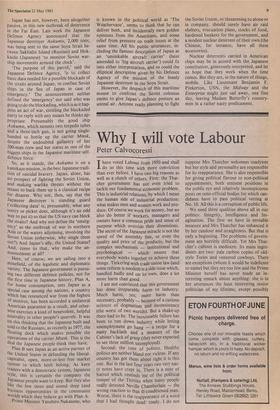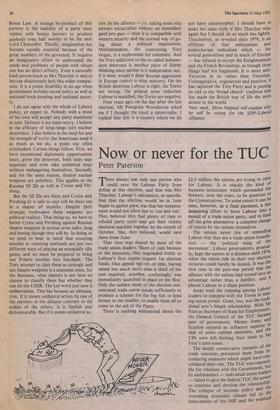Why I will vote Labour
Peter Calvocoressi
T have voted Labour from 1950 and shall 1 do so this time with more conviction than ever before. I have two big reasons as well as a clutch of others. First: the That- cher government has not even tried to tackle our fundamental economic problem. This is industrial relations, by which I mean the human side of industrial production: what makes men and women work and pro- duce. Of course we work for money, but we also do better if workers, managers and owners have a common pride and sense of purpose which override their dissensions. The secret of the Japanese miracle is not the speed of the assembly line, or even the quality and price of the products, but the complex mechanisms — institutional and psychological — which ensure that everybody works together to achieve these things. Tinkering with trade union law (and some reform is needed) is a side issue which, handled badly and on its own, does a lot more harm than good.
I am not convinced that this government has done irreparable harm to industry. Much harm, yes; more harm than necessary, probably — because of a curious mixture of dogmatism and inconsistency (the worst of two worlds). But a shake-up there had to be. The inexcusable failure has been to run down industry while letting unemployment go hang — a recipe for a nasty backlash and a measure of the Cabinet's lack of grasp (they never expected to see three million unemployed).
Second: the tone of politics. Healthy politics are neither bland nor vicious. if any country has got them about right it is this one. But in the last four years two very nas- ty notes have crept in. There is a note of hatred which reminds me of the political temper of the Thirties when many people really detested Neville Chamberlain — the wrong reaction to that ill-conditioned man. Worse, there is the reappearance of a word that I had thought dead: toady. I do not suppose Mrs Thatcher welcomes toadyism but her style and personality are responsible for its reappearance. She is also responsible for giving political flavour to non-political appointments, both eminent positions in the public eye and relatively inconspicuous posts on semi-official bodies for which can- didates have to pass political vetting at No. 10. All this is a corruption of public life.
We need three qualities above all in our politics: Integrity, Intelligence and Im- agination. The first we have in enviable measure and Mrs Thatcher has enhanced it by her candour and straightness. But that is only a beginning. The problems of govern- ment are horribly difficult. Yet Mrs That- cher's cabinet is mediocre. Its main ingre- dients are two: pale carbon copies of old- style Tories and veneered cowboys. There are exceptions (whom it would be indelicate to name) but they are too few and the Prime Minister herself has never made an in- teresting remark about anything: she is in her utterances the least interesting senior politician of my lifetime, except possibly Bonar Law. A strange by-product of this poverty is the inability of a party once replete with brainy lawyers to produce anybody even half worthy to be the next Lord Chancellor. Thirdly, imagination has become equally essential because of the great numbers of the governed. It requires an imaginative effort to understand the needs and problems of people with whom one has no direct affinity. Even a naturally kind person (such as Mrs Thatcher is said to be) can disastrously lack this wider compas- sion. It is a prime disability in an age when government includes social policy as well as national book-keeping and national securi- ty.
I do not agree with the whole of Labour policy, or expect to. Nobody with a mind of his own will accept any party manifesto in toto. Defence is my main worry. I believe in the efficacy of long-range (sic) nuclear deterrence. I also believe in the need for and the strength of NATO: the Americans need it as much as we do, a point too often overlooked. Certain things follow. First, we have exceptional diplomatic opportunities since, given the deterrent, both sides may negotiate and even take unilateral steps without endangering themselves. Secondly and for the same reason, theatre nuclear weapons are pointless. This applies to the Russian SS 20s as well as Cruise and Per- shing.
But the SS 20s are there and Cruise and Pershing (it is safe to say) will be there too in a matter of months. Despite their strategic irrelevance these weapons are political realities. That being so, we have to barter Cruise and Pershing against Russian theatre weapons in serious arms talks, long and boring though they will be. In doing so we need to bear in mind that counting missiles or counting warheads are just two different ways of playing an essentially silly game; and we must be prepared to bring our Polaris missiles into hotchpot. The Tory attempt to class them as strategic and not theatre weapons is a nonsense since, for the Russians, what matters is not how we choose to classify them but whether they can hit the USSR. The key word just now is unilateralism. This has become an obfusca- tion. If it means unilateral action by one of the partners in the alliance contrary to the wishes of the others, it is foolish and dishonourable. But if it means unilateral ac- tion by the alliance — i.e. taking some step (always retractable) without an immediate quid pro quo — then it is compatible with western security and the normal way of go- ing about a political negotiation. Multilateralism, the contrasting Tory slogan, is a euphemism for stalemate. And the Tory addiction to the so-called indepen- dent deterrent is another piece of flabby thinking since neither is it independent nor, if it were, would it deter Russian aggression in Europe (which is what matters). On the British deterrent Labour is right, the Tories are wrong. On general arms reduction Labour is muddled, the Tories are negative.
Four years ago, on the day after the last election, Mr Peregrine Worsthorne asked me if I thought the result a catastrophe. I replied that this is a country where we do not have castastrophes. I should have to make the same reply if Mrs Thatcher wins again but I should do so much less lightly. Thatcherism, as revealed since 1979, is an offshoot of that antiquarian and authoritarian radicalism which — for several generations and in much of Europe — has refused to accept the Enlightenment and the French Revolution, as though these things had not happened. It is more anti- Victorian in its values than Victorian- Unimaginative, ungenerous and punitive, it has captured the Tory Party and is putting an end to the 'broad church' tradition that has made the British way of life the most decent in the world.
Next week, Shiva Naipaul will explain wIlY he will be voting for the SDP/Liberal Alliance.











































 Previous page
Previous page